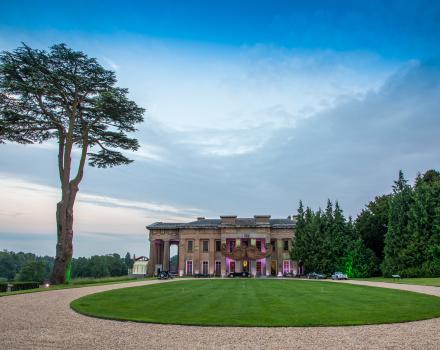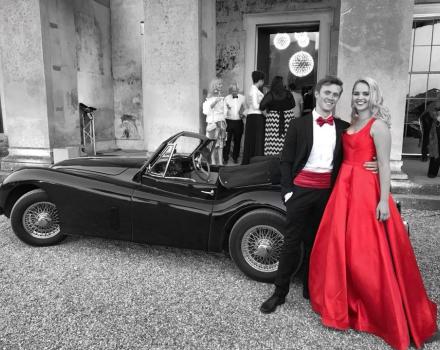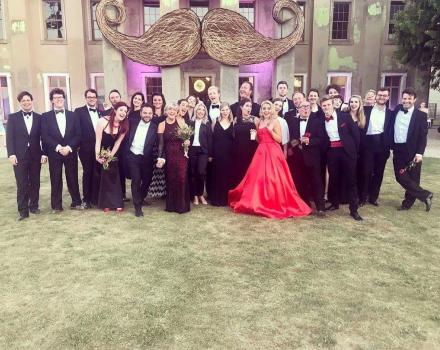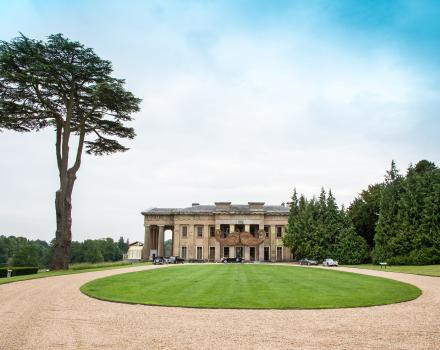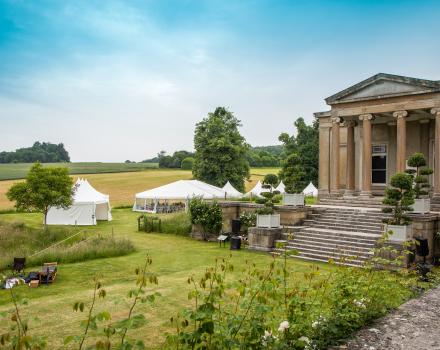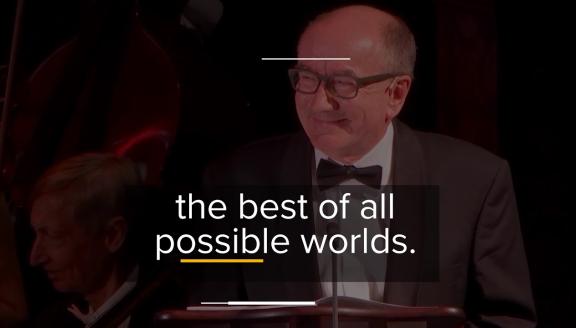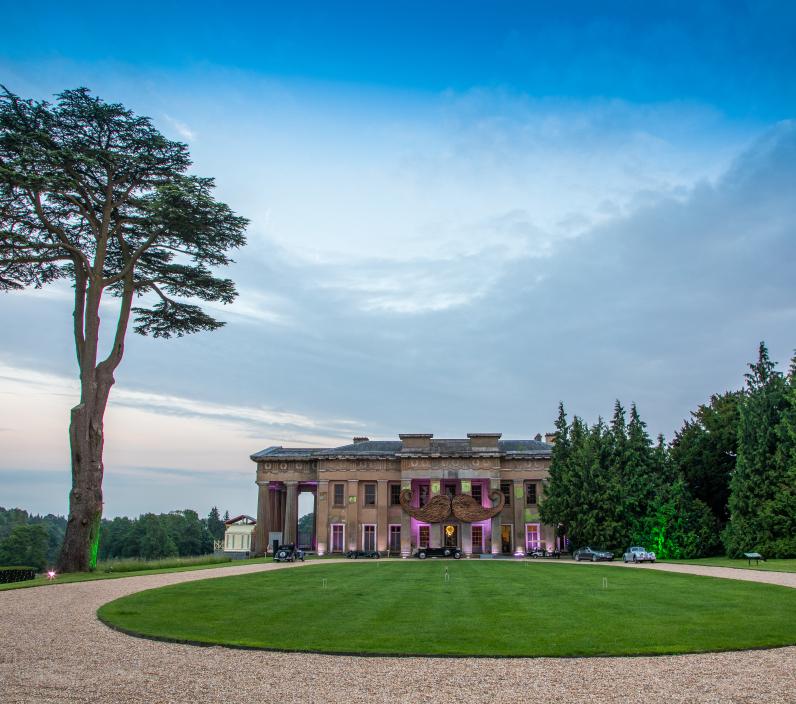

Candide

When young Candide's marriage offer to a baron's daughter backfires, the naïve student of optimism is hurled into an eye-opening journey around the globe, discovering the horrors of existence at every step.
Turning Voltaire’s Candide, a stinging blast against tyranny and feigned moralising, into toe-wiggling musical theatre is a crazy idea. Bernstein revised his operetta countless times before settling on the final version. The Grange Festival’s 2018 semi-staged production commemorates the composer’s 100th birthday.
Cast
Narrator/Pangloss/Martin | Richard Suart |
|---|---|
Candide | Rob Houchen |
Cunegonde | Katie Hall |
Maximilian | Charles Rice |
Old Woman | Rosemary Ashe |
Paquette | Kitty Whately |
Cacambo/Governor/Vanderdendur/1st Agent | Robert Murray |
Chorus | The Grange Festival Chorus |
Orchestra | Bournemouth Symphony Orchestra |
| ... | |
Music | Leonard Bernstein |
|---|---|
Conductor | Alfonso Casado Trigo |
Director | Christopher Luscombe |
Text | Richard Wilbur |
Chorus Master | Tom Primrose |
| ... | |
Video
The story
Act I
In Westphalia, at Schloss Thunder-ten-Tronck, the ancestral home of the Baron, the Baron’s children, Cunegonde and Maximilian, along with their illegitimate cousin, Candide, and the maid, Paquette, are instructed by their tutor, Dr Pangloss, that ‘all is for the best in this best of all possible worlds.’
To the Baron’s dismay, Candide and Cunegonde fall in love, and Candide is banished from Westphalia. Invading Bulgarians abduct Candide and slaughter the rest of the family, except Cunegonde, who is abducted and eventually becomes a popular prostitute.
Despite becoming the mistress of both a wealthy Jew and the Cardinal Archbishop of Paris, she still loves Candide.
Candide, rescued by travelling actors, retains his faith in the teachings of Dr Pangloss, whom he encounters by chance. Candide and Dr Pangloss are arrested for their liberal philosophy and dragged off to Lisbon, where the Grand Inquisitor orders Pangloss to be hanged and Candide whipped. A kind, but eccentric Old Lady rescues him and nurses him back to health, before reuniting him with Cunegonde in Paris.
When first the wealthy Jew, and then the Cardinal Archbishop, interrupt the lovers’ reunion, Candide inadvertently kills them. Candide, Cunegonde, and the Old Lady flee Paris for Cadiz and then set sail for the New World.
Act II
Upon arrival in Montevideo, South America, Paquette and Maximilian are sold into slavery. By chance, Candide, Cunegonde and the Old Lady arrive at the same location, but Candide must flee when the Old Lady convinces him that he is being pursued for the murder of the Jew and Cardinal Archbishop. When Candide swears to marry Cunegonde, Maximilian objects and is accidentally killed by Candide as the two engage in a scuffle.
Candide then escapes into the South American jungle and stumbles upon the fabled city of El Dorado, where all is opulent and perfect. Tiring of paradise, Candide leaves, laden with sheep, gold, and gems, and heads for the Dutch colony of Surinam. There, he learns that pirates have taken Cunegonde to Venice.
Vanderdendur, a Dutch merchant, offers Candide a boat with which to rescue Cunegonde, but Candide soon discovers that the merchant’s generosity was a sham. Candide finds Cunegonde, Paquette, and the Old Lady in Venice. There, Candide uses all their remaining riches to buy the freedom of Cunegonde and Maximilian, who is not dead after all.
Now reunited, Cunegonde, Paquette, Maximilian, the Old Lady and Dr Pangloss join Candide as he decides to follow his new creed. With his ragtag ‘family’, he will settle down to a simple farm life and ‘make our garden grow.’
Insights
A Valentine card to Bernstein’s Candide
In 1953, the well-known playwright Lillian Hellman suggested to Leonard Bernstein that he adapt Voltaire's Candide for music theatre. Voltaire's 1759 novella satirised the popular philosophies of his time and specifically targeted the Catholic Church, whose Inquisition tortured alleged heretics to death in the infamous event known as Auto da fé, (Portuguese for ‘act of faith’). Observing an uncanny resemblance between the hypocrisy and violence of the Inquisition purges and the tactics used by the House Un-American Activities Committee, fueled by anti-Communist propaganda, Hellman delighting in the idea of drawing parallels between Voltaire’s biting satire and current US politics.
‘That was the time of the Hollywood Blacklist…television censorship, lost jobs, suicides, expatriation and the denial of passports to anyone even suspected of having once known a suspected communist. I can vouch for this; I was denied a passport by my own government. By the way, so was Voltaire… His answer was satire, ridicule and, through laughter, to provoke in his reader self-recognition and, of course, self-justification: ‘Who, me? Not me.’ Which produces discussion, makes debate—and debate is, after all, the cornerstone of democracy. So Lillian and I were naturally magnetized by Voltaire’s…wit and wisdom, and quickly set about our work…’
– Bernstein in the notes for a 1989 concert version of Candide
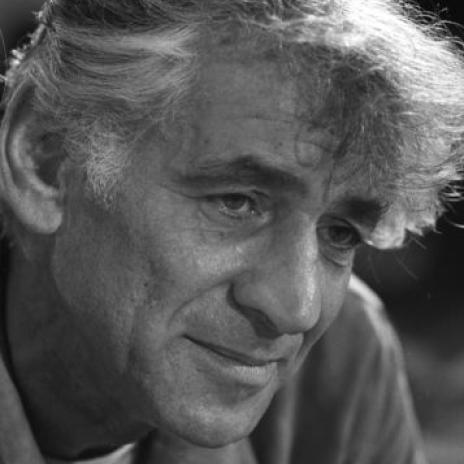
Hellman started work on the libretto, helped by the poet John Latouche and Bernstein himself, who wrote numerous musical sketches. Soon the poet Richard Wilbur replaced Latouche. Hellman, Bernstein and Wilbur worked together regularly until 1956, with Bernstein simultaneously composing West Side Story. In October of that year, Candide was ready to be performed in Boston, where the poet and writer Dorothy Parker contributed lyrics to The Gavotte of Venice, while Bernstein and Hellman supplemented their own lyrics to other numbers. The list of illustrious lyricists was getting longer and longer.
Candide first opened on Broadway as a musical on 1 December 1956. The premiere production was directed by Tyrone Guthrie and conducted by Samuel Krachmalnick. Ironically, it is the very attitude of speaking truth to power, which first attracted Hellman and Bernstein to the project, that threatened the performance. Guthrie was particularly apprehensive of the ‘Auto da Fé’ scene with its unashamed mockery of the House Un-American Activities Committee. Would the urgent political impulse for the musical’s creation pass the test of time?
When one has something unpleasant to say, one should always be quite candid.
Even though Candide sparkles with ideas, its heavy agenda weighed it down. If the build-up to its premiere was extensive, the work on its numerous revisions thereafter took longer. Considered one of the most laboured over Broadway shows in history, it endured many incarnations before Bernstein created what he called the ‘Final Revised Version’. He presented it with the London Symphony, which he presided over, at the Barbican in December 1989.
What, then, does remain of Bernstein’s witty, fast-paced interpretation of Voltaire’s satire? Despite eradicating all hope with its glaring portrait of moral corruption and natural catastrophes, Candide inexplicably leaves the listener in a buoyant mood. Conceived as a ‘Valentine card to European music’, the score teems with references to various dance forms such as the gavotte, waltz and polka and is interlaced with bel canto arias, Gilbert and Sullivan-type comedy, grand opera and what Bernstein called ‘Jewish tango.’ Bernstein’s ability to explore the depths of human depravity so irreverently and lightheartedly shows every sign of a stroke of genius. Starting with the overture’s crystal clear wit by way of the sarcastic ‘Auto-da-fé (What a Day)’, Bernstein comes full circle with the finale ‘Make our Garden Grow’. Granted, in the context of the story, any utopia is suspicious and exposed as a sham. Standing alone, however, the listener can indulge in a moment of sincere optimism. No longer is it the optimism of innocence, it is the stance of one who dares to hope in spite of all odds.
We're neither pure, nor wise, nor goodWe'll do the best we know.We'll build our house and chop our woodAnd make our garden grow.
Gallery
